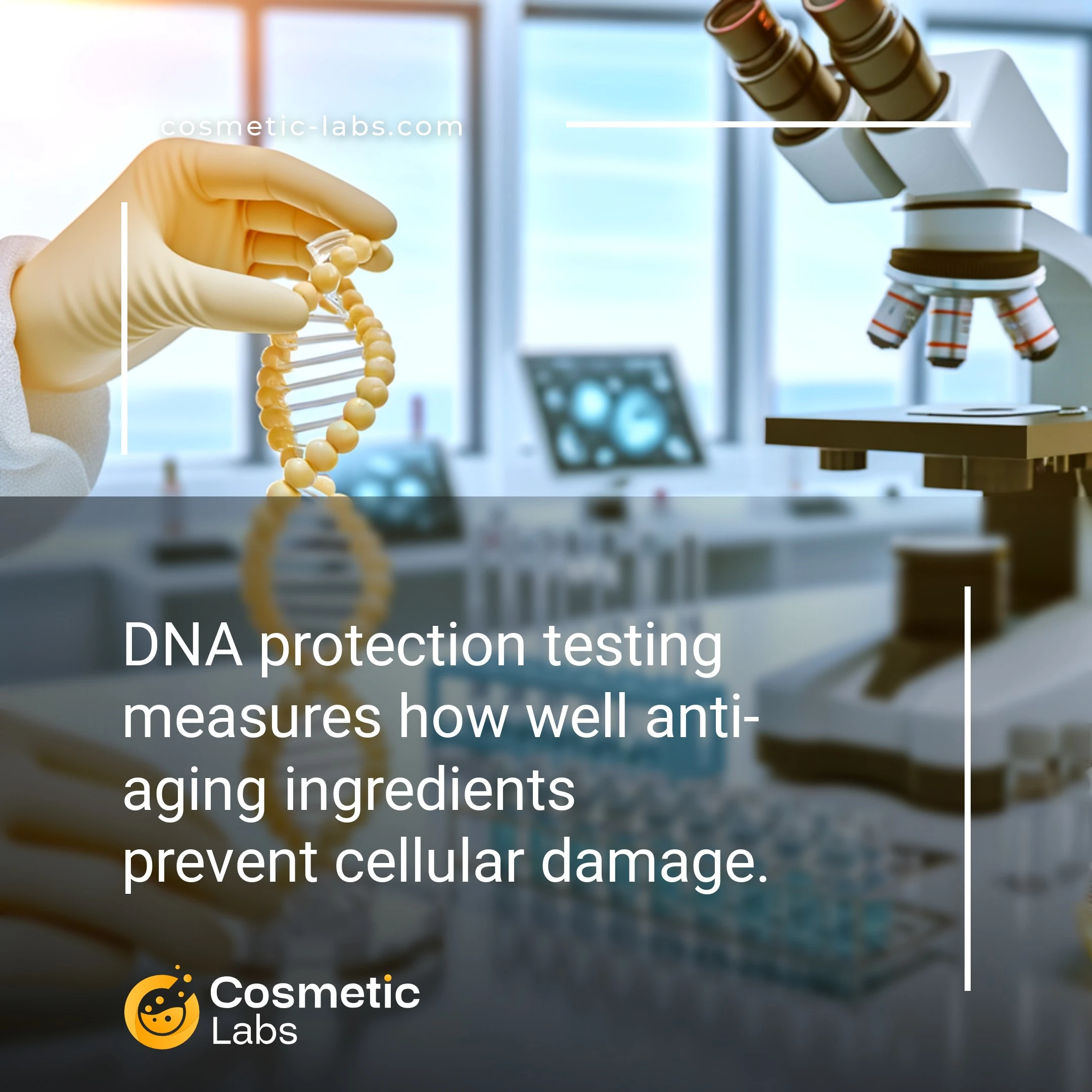DNA Protection Testing Services for Anti-Aging Cosmetics

What is DNA protection testing?
DNA protection testing for anti-aging services measures how well cosmetic ingredients shield skin cells from oxidative damage and UV-induced DNA breaks. Labs use comet assays and 8-oxoguanine markers to quantify protection levels, with results showing up to 40% reduction in DNA damage for proven antioxidants like vitamin C and resveratrol—data that supports your product’s anti-aging claims.
Why do you need this service?
Cosmetic labs use DNA protection testing to validate anti-aging claims for serums and creams containing antioxidants, peptides, or botanical extracts. Testing measures how formulations prevent UV-induced DNA damage in skin cells, generating quantifiable data for marketing claims and regulatory submissions. Brand owners rely on these assays to differentiate products in competitive markets and support premium positioning strategies.
Who provides DNA protection testing services?
All cosmetic labs providing DNA protection testing services
There is no company providing these services at the moment.
DNA Protection Testing for Anti-Aging Formulations
DNA protection testing measures how well anti-aging ingredients shield cellular DNA from oxidative damage and environmental stressors. This testing validates your product’s ability to prevent premature aging at the molecular level, providing scientific backing for anti-aging claims.
Cellular DNA Damage Assessment Methods
Labs use specialized assays to measure DNA strand breaks and cellular repair mechanisms. The comet assay tracks DNA fragmentation in real-time, while 8-oxoguanine testing identifies oxidative DNA damage markers. These methods show exactly how your ingredients protect against UV radiation, pollution, and free radical damage.
Testing protocols typically include:
- UV-induced DNA damage protection studies
- Oxidative stress resistance measurements
- Cellular repair enhancement evaluation
- Mitochondrial DNA protection analysis
Telomere Length and Cellular Aging Analysis
Telomere protection testing evaluates how formulations preserve chromosome ends that naturally shorten with age. Labs measure telomerase activity and telomere length changes after ingredient exposure. This data supports claims about cellular longevity and age reversal at the genetic level.
Advanced testing includes epigenetic markers and gene expression analysis. Labs track changes in aging-related genes like SIRT1 and p53, providing molecular evidence of anti-aging effects. Results help brands substantiate premium positioning and regulatory compliance for age-defying products.
Connect with specialized labs on our platform to access DNA protection testing services that validate your anti-aging formulations with scientific precision.
Practical Applications of DNA Protection Testing in Anti-Aging Product Development
DNA protection testing applications provide cosmetic brands with measurable data to validate anti-aging claims and optimize formulation strategies.
Ingredient Screening and Formulation Optimization
Labs use DNA protection assays to evaluate raw materials and active ingredients before formulation begins. The comet assay measures DNA strand breaks in skin cells exposed to UV radiation, while the micronucleus test identifies genotoxic effects from environmental stressors.
Brands screen botanical extracts, peptides, and antioxidants at concentrations ranging from 0.1% to 5% to determine optimal dosing. Results typically show 15-40% reduction in DNA damage within 24-48 hours of treatment. This data guides formulation decisions and supports ingredient sourcing strategies.
| Testing Method | Damage Type Measured | Typical Results Timeline | Cost Range |
|---|---|---|---|
| Comet Assay | DNA strand breaks | 24-72 hours | $800-1,200 |
| Micronucleus Test | Chromosomal damage | 48-96 hours | $600-900 |
| 8-OHdG Analysis | Oxidative DNA damage | 3-5 days | $1,000-1,500 |
Product Claims Validation and Regulatory Support
DNA protection testing validates specific anti-aging claims for marketing materials and regulatory submissions. Labs test finished products against UV-induced DNA damage using standardized protocols that measure protection percentages and repair enhancement.
Brands receive quantitative data showing DNA damage reduction rates, typically expressed as IC50 values or percentage protection at specific concentrations. This testing supports claims like “protects against environmental DNA damage” and “enhances cellular repair mechanisms.” Results help brands differentiate products in competitive markets while meeting substantiation requirements.
Ready to validate your anti-aging formulations with DNA protection testing? Connect with experienced cosmetic labs on our platform to discuss your specific testing needs and timeline requirements.
